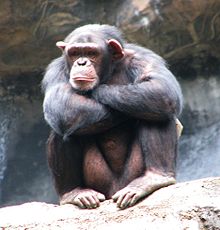
Affable apes apt to live longer, study shows
Edinburgh, Oct 10 (IBNS): Male chimps that are less aggressive and form strong social bonds tend to live longer, research suggests.
A study of hundreds of captive chimpanzees showed that males that get along well with others – by being sensitive, protective and cooperative – outlived their less amiable peers.
Personality traits
The team, led by researchers at the University of Edinburgh, found that, contrary to studies of humans and other primates, being more extroverted, conscientious or neurotic had no impact on chimpanzee’s longevity.
Extraversion is frequently associated with longer life in other nonhuman primates, while conscientiousness and neuroticism are associated with longer and shorter life, respectively, in humans.
Using personality and survival data from 538 chimpanzees – our closest ape relative – the study tested which aspects of their personalities were associated with longevity.
Evolution
Results suggest that amongst male chimps, evolution has favoured those that are more agreeable.
Researchers also found some evidence that female chimps who demonstrated openness – those who more readily explored and adapted to changes in their physical and social environments – were more likely to live longer.
Assessment
The researchers, including colleagues from the US and Japan, assessed chimps’ personalities based on a questionnaire of common adjectives and chimpanzee behaviours completed by keepers and researchers who worked with these animals for between seven and 24 years.
The chimps lived in zoos, research facilities and sanctuaries located in the UK, US, Netherlands, Australia and Japan.
The study, published in eLife, is the one of the largest ever analyses of individual behaviour data from chimpanzees or any other great ape.
Image: Wikimedia Commons
Support Our Journalism
We cannot do without you.. your contribution supports unbiased journalism
IBNS is not driven by any ism- not wokeism, not racism, not skewed secularism, not hyper right-wing or left liberal ideals, nor by any hardline religious beliefs or hyper nationalism. We want to serve you good old objective news, as they are. We do not judge or preach. We let people decide for themselves. We only try to present factual and well-sourced news.







